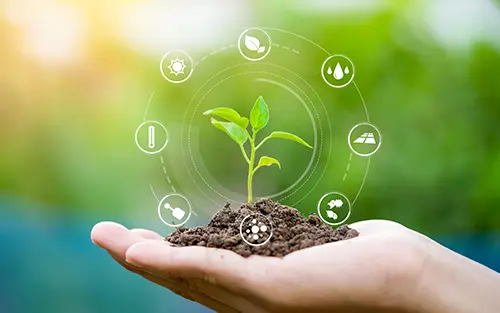The Connection Between Agriculture and Technology: A Modern Harvest of Innovation
In the ever-evolving landscape of the agricultural sector, the symbiotic relationship between agriculture and technology has taken center stage. Reshaping the way we grow, cultivate, and harvest food. This intricate interplay between traditional farming practices and cutting-edge technological advancements has ushered in a new era of agricultural productivity. Sustainability, and global food security.
The Intersection of Local and Modern Technology in Agriculture
When exploring the connection between agriculture and technology, it’s crucial to distinguish between local and modern technology within the agricultural sector. Local technology often refers to traditional, region-specific practices that have been passed down through generations. These methods are deeply rooted in local knowledge, climate, and resources, ensuring the cultivation of crops suitable for the specific environment. On the other hand, modern technology encompasses a wide array of innovations, including precision agriculture. IoT (Internet of Things) devices, drones, and data-driven analytics. While local technology preserves cultural heritage and maintains community resilience, modern technology offers unprecedented precision, efficiency, and scalability. The amalgamation of these approaches has led to a holistic and adaptable agricultural ecosystem
Unveiling New Technologies and Methods in Agriculture
The contemporary agricultural landscape is adorned with a plethora of groundbreaking technologies and methods that have revolutionized the sector. Precision agriculture, a prime example, employs satellite imagery and GPS technology to precisely manage crops, optimizing water and fertilizer usage while reducing environmental impact. Vertical farming and hydroponics have emerged as innovative solutions for urban agriculture, utilizing controlled environments and minimal resources to maximize yields. Furthermore, CRISPR-Cas9 gene editing technology has enabled the development of crops with enhanced resistance to pests, diseases, and harsh climates. The synergy between these advancements cultivates a future where farms are intelligent, data-driven ecosystems capable of feeding an ever-expanding global population.
Pioneering Nations in Advanced Agricultural Technology
As the nexus of agriculture and technology continues to evolve, certain nations have risen to the forefront of advanced agricultural innovation. The Netherlands, often referred to as the “Silicon Valley of Agriculture,” boasts cutting-edge practices such as vertical farming, automated greenhouses, and smart irrigation systems. Israel, despite its arid climate, has harnessed technology to become a leader in precision agriculture, water management, and crop enhancement. Similarly, the United States has embraced genetic engineering and biotechnology, driving advancements in crop quality and yield. These nations collectively showcase the limitless potential of technology to overcome geographical limitations and redefine agricultural boundaries.
Harnessing the Power of Artificial Intelligence in Agriculture
Artificial Intelligence (AI) has woven itself into the fabric of agriculture, enhancing efficiency, decision-making, and resource allocation. AI-driven predictive analytics analyze vast datasets to optimize planting schedules, monitor crop health, and predict disease outbreaks. Drones equipped with AI-powered cameras offer real-time field insights, detecting anomalies and facilitating targeted interventions. Smart sensors embedded in the soil provide accurate moisture and nutrient readings, enabling farmers to tailor irrigation and fertilization. Through AI’s cognitive capabilities, agriculture transcends traditional practices, embarking on a journey of data-driven growth and sustainability.
Five Transformative Examples of Agricultural Technology
- Precision Agriculture: Leveraging GPS and IoT devices, precision agriculture enables farmers to apply resources precisely where needed, reducing waste and enhancing yields.
- Vertical Farming: In vertical farms, crops are grown in vertically stacked layers, using LED lighting and hydroponic systems to optimize space and resource utilization.
- CRISPR-Cas9 Gene Editing: Genetic modification empowers scientists to edit plant DNA, introducing desired traits that confer resilience, nutrition, and productivity.
- Smart Irrigation Systems: IoT-enabled sensors monitor soil conditions and weather patterns, adjusting irrigation schedules to conserve water and maximize efficiency.
- Automated Harvesting: Robotics and AI-driven machines are streamlining harvesting processes, reducing labor costs, and minimizing crop damage.
The Bountiful Benefits of Modern Agricultural Technology
The infusion of modern technology into agriculture has yielded a cornucopia of benefits, propelling the sector into an era of unparalleled progress:
- Enhanced Productivity: Automation, precision, and data-driven insights amplify crop yields and streamline farming operations.
- Resource Efficiency: Technology optimizes resource utilization, minimizing water waste, fertilizer runoff, and energy consumption.
- Sustainable Practices: Innovative solutions promote sustainable agriculture by reducing environmental impact and conserving biodiversity.
- Food Security: Advanced techniques ensure a stable food supply, enabling nations to overcome challenges posed by climate change and population growth.
- Economic Growth: Agricultural technology fosters economic prosperity by increasing agricultural output, creating jobs, and stimulating rural development.
The World Transformed: How Technology Shapes Our Future
In an interconnected world, the influence of technology extends far beyond fields and barns, resonating with every facet of human existence. Modern technology has propelled agriculture from a labor-intensive, weather-dependent endeavor to a dynamic, data-driven enterprise that transcends geographical constraints. As technology permeates agriculture, its ripple effects touch supply chains, economies, and the lives of individuals worldwide. The digital age has ushered in a transformative era, where the connection between agriculture and technology has not only increased crop yields. But, also sown the seeds of innovation, sustainability, and a brighter tomorrow.
In conclusion, the connection between agriculture and technology weaves a narrative of innovation, resilience, and abundance. The harmonious integration of local wisdom and modern marvels has redefined the agricultural landscape. Ensuring a future where technology plows the fields of progress and nourishes the world. As nations unite under the banner of agricultural advancement, the symphony of innovation resonates. Promising a world where fields, powered by technology, yield a harvest of prosperity for generations to come.

